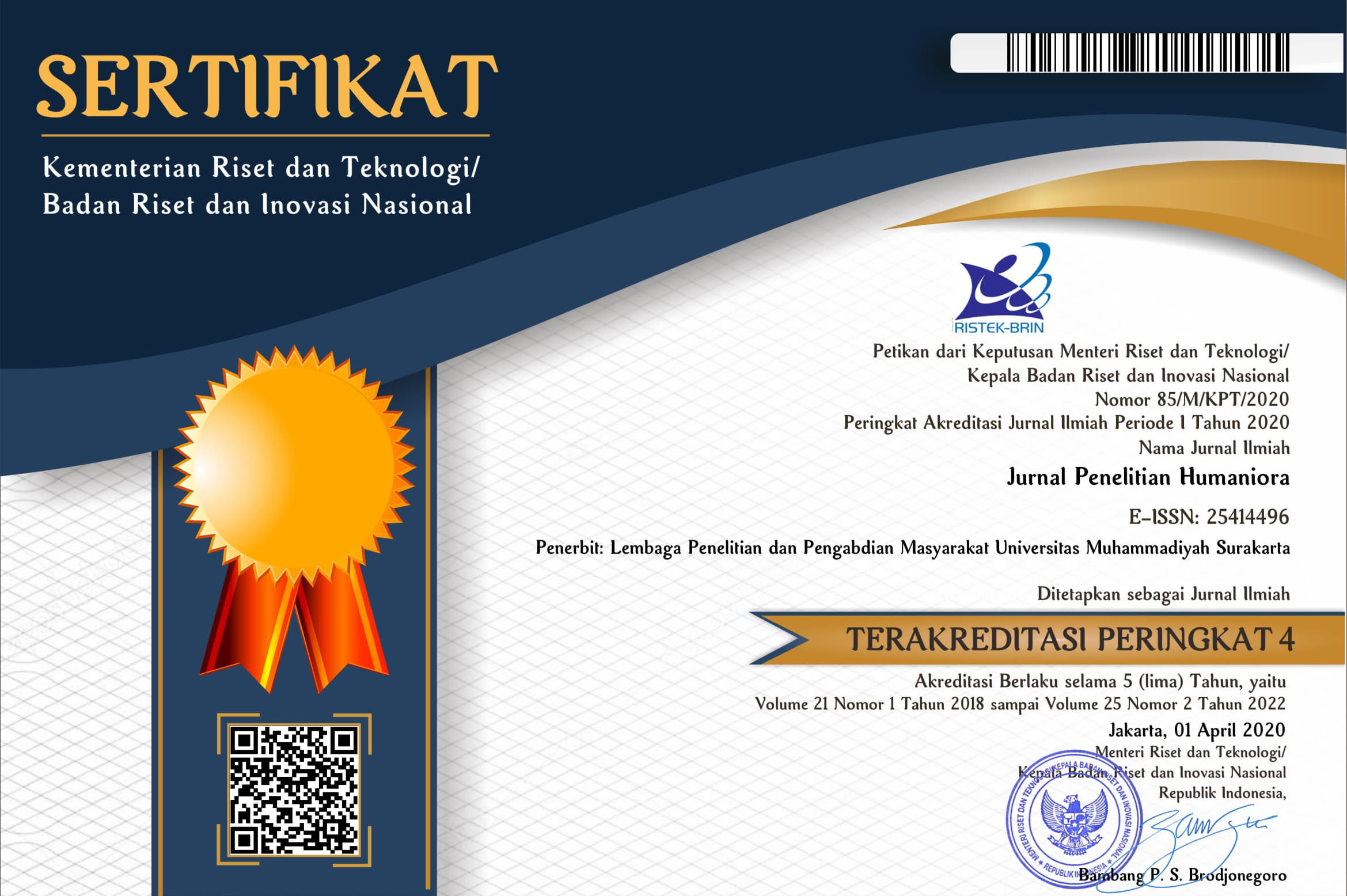PERILAKU TINDAK TUTUR USTAD DALAM PENGAJIAN: KAJIAN SOSIOPRAGMATIK DENGAN PENDEKATAN BILINGUAL
Rini Indah Sulistyowati(1*), Harun Joko Prayitno(2), Yakub Nasucha(3)(1) Universitas Muhammadiyah Surakarta
(2) Universitas Muhammadiyah Surakarta
(3) Universitas Muhammadiyah Surakarta
(*) Corresponding Author
Abstract
In general, the purpose of this study is to describe the illocutionary speech act of chap- lain using bilingual approach. This is a qualitative research. The data are in the form of speech collected from recordings of cleric K.H. Anwar Zahid from Bojonegoro, East Java as the informant. Data collection techniques used are observation and recording. Data analysis used is equivalent intralingual method aith comparative technique. The results of this study indicate as follows: (a) Assertive modes are expressed in the form of Javanese-Arabic and Arabic-Indonesian; complain mode are in Arabic-Javanese and Arabic-Indonesian); (b) Directive modes are in Arabic-Javanese and Arabic-Indone- sian) and advising modes are in Arabic-Javanese and Arabic-Indonesian); (c) there are commissive mode of offers in Arabic-Javanese and Javanese-Indonesian), (d) Expres- sive congratulation mode in Arabic-Javanese); (e) Declaration form naming mode is in Javanese-Arabic and Arabic-Indonesian. Speech acts used in the teachings are direct speech act, such as to govern, inform or do something directly. The direct speech is used in the form of questions in Arabic-Javaneseand commands Arabic-Javanese and Indo- nesian-Arabic.
Keywords
Full Text:
PDFReferences
Coumings, Louise. 2007. Pragmatik: Sebuah Perspektif Multidisipliner. Yogyakarta: Pustaka Pelajar.
Chaer, Abdul dan Leonie Agustina. 2010. Sosiolinguistik. Jakarta: Rineka Cipta.
Gunarwan, Asim. 1994. “ Kesantunan Negatif di Kalangan Dwibahasawan
Indonesia-Jawa di Jakarta: Kajian Sosiopragmatik” dalam PELLBA 7. Jakarta: Pusat Kajian Bahasa dan Budaya Unika Atmajaya.
Leech, Geoffrey N. 1993. Prinsip-Prinsip Pragmatik (Terj.). Jakarta: Universitas Indonesia.
Mahsun, M.S. 2005. Metode Penelitian Bahasa: Tahapan Strategi Metode dan Tekniknya. Jakarta: Raja Grafindo Persada.
Prayitno, Harun Joko. 2008. “Tindak Tutur Direktif Pejabat dalam Peristiwa Rabat Dinas: Kajian Sosiopragmatik Berpresfektif Jender di Lingkungan Pemerintah Kota Surakarta” Disertasi. Surakarta: Pascasarjana Universitas Sebelas Maret.
.2011. Kesantunan Sosiopragmatik. Surakarta: Muhammadiyah University Press.
Samavarchi, Laila. 2012.”Giving Condolences by Persian EFLLearners:AContrastive Sociopragmatic Study” dalam International Journal of English Linguistics Vol. 2, No. 1; February 2012. Iran: Yazd University dan Iran Language Institute.
Sudaryanto. 1993. Metode dan Aneka Teknik Analisis Bahasa. Yogyakarta: Duta Wacana University Press.
Tarigan, Henry Guntur. 1986. Pengajaran Pragmatik. Bandung: Angkasa Bandung.
Wijana, I Dewa Putu. 1996. Dasar-dasar Pragmatik. Yogyakarta: Andi Yogyakarta.
Yang, Dayong. 2011. “Studies to Bilingual Education of Chinese University Undergraduate Course” dalam journal Studies in Literature and Language. p. 35-45, Vol.2, No.2. Tahun 2011. Cina: Chinese University.
Yule, George. 2006. Pragmatik. Yogyakarta: Pustaka Pelajar.
Article Metrics
Abstract view(s): 1222 time(s)PDF: 877 time(s)
Refbacks
- There are currently no refbacks.











